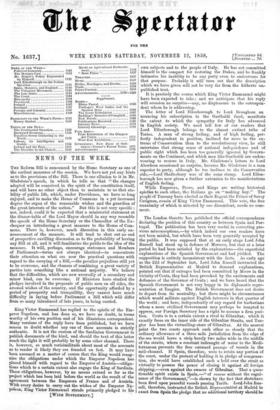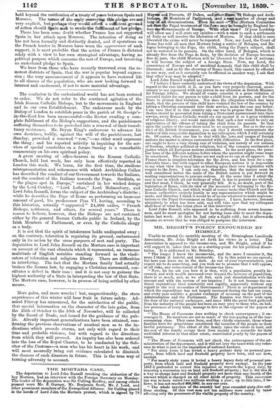The London Gazette has published the official correspondence declaring the
position of this country as between Spain and Por- tugal. The publication has been very useful in correcting pre- vious misconceptions,—by which indeed our own readers have not been misled, but which have been very generally accepted by the public. It was supposed that at an early stage Lord John Russell had stood up in defence of Morocco, but that at a later period he had been satisfied by the explanations—the superficial explanations of the Spanish Government and had yielded. The supposition is entirely inconsistent with the facts. As early ago as the 22d of September last, Lord John Russell instructed the British Representative at Madrid to demand explanations, pointed out that if outrages had been committed by Moors in the vicinity of Ceuta, they had been provoked by the excitements and defiances of the Governor of Ceuta ; and we have heard that the Spanish Government is not very happy in its diplomatic repre- sentation at Tangier. The British Government does not desire to depart from its neutrality, but there might be circumstances which would militate against English interests in that quarter of 'the world ; and here, independently of any regard for barbarians whom a more civilized Government may perhaps be tempted to oppress, our Foreign Secretary has a right to assume a firm posi- tion. Ceuta is to a certain extent a rival to Gibraltar, which it exactly faces on the inner side of the Gibraltar Straits, and Tan- gier has been the victualling-store of Gibraltar. At the nearest point the two coasts approach each other so closely that the ordinary allowance of a three mile jurisdiction from the edge of the sea would leave a strip barely two miles wide in the middle of the straits, where a constant indraught of water to the Medi- terranean prevents the free outward passage of vessels in the mid-channel. If Spain, therefore, were to retain any portion of the coast, under the pretext of holding it in pledge of compensa- tion, she would have established such a hold over the strait as virtually to possess the power of closing it against all foreign shipping,—even against the owners of Gibraltar. That a ques- tionable spirit exists in Spain,—" of course without the cogni- sance of the Government,"—is shown by the fact that shotshave been fired upon peaceful vessels passing Tarifa. Lord John Rus- sell, therefore, instructed the British Representative at Madrid to exact from Spain the pledge that no additional territory should be held beyond the ratification of a treaty of peace between Spain and Morocco. The !tams of the reply conveying this pledge are not very explicit, but perhaps -they ,would afford a sulacient ground of action should Spain meek to wade din f-ulfilment,of her pledge.
There has been some doubt whether Trance has not supported Spain in her attack upon Morocco. The intention of doing so has not been formally and distinctly denied, and if operations on the French border in Morocco have worn the appearance of such support, it is most probable that the action of France is dictated solely with a view to her own strategical advantage, having no political purpose which concerns the rest of Europe, and involving no underhand pledge to Spain.
We hear from those who have recently traversed even the re- motest districts of Spain, that the war is popular beyond expres- sion ; the very announcement of it appears to have restored life to all classes of the population, who are now looking forward to interest and excitement, if not to more material advantage.



































 Previous page
Previous page